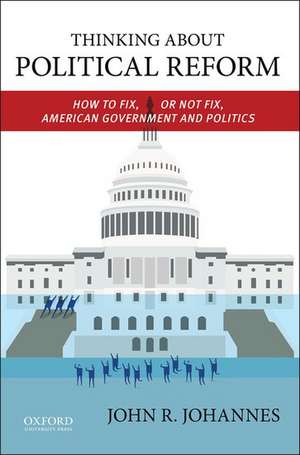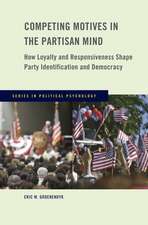Thinking About Political Reform: How to Fix, or Not Fix, American Government and Politics
Autor John Johannesen Limba Engleză Paperback – 22 oct 2015
Preț: 468.11 lei
Nou
Puncte Express: 702
Preț estimativ în valută:
89.58€ • 95.78$ • 74.68£
89.58€ • 95.78$ • 74.68£
Carte disponibilă
Livrare economică 28 martie-11 aprilie
Preluare comenzi: 021 569.72.76
Specificații
ISBN-13: 9780199937998
ISBN-10: 0199937990
Pagini: 328
Dimensiuni: 229 x 157 x 18 mm
Greutate: 0.48 kg
Editura: Oxford University Press
Colecția OUP USA
Locul publicării:New York, United States
ISBN-10: 0199937990
Pagini: 328
Dimensiuni: 229 x 157 x 18 mm
Greutate: 0.48 kg
Editura: Oxford University Press
Colecția OUP USA
Locul publicării:New York, United States
Recenzii
I would definitely recommend it as one of the best summaries and critical evaluation of reform proposals currently available. One of the book's best points is the appreciation of how reforms interact, and how any serious reform proposal has to take this into account and also consider the consequences if only part of their reform package is actually adopted. As the author notes, we have got part of the package of responsible party government, but without the full adoption it doesn't seem to be working so well. There are many good insights like this throughout the text.
This book's competitive advantage is that it is more complete in its coverage of reform ideas across traditional course topics. American government courses are typically divided into three parts: foundations, politics, and institutions. This book includes chapters appropriate for all three parts of the course. There are no gaps.
If you wanted to read a text that made a pretty grand attempt at uncovering and explaining a huge array of political and electoral reforms that challenges established conventions, you should read this. - Rick D. Henderson, Texas State University
To my knowledge, there is nothing else out there on the market today that attempts to tackle the subject of reform in American politics in such a comprehensive and sweeping way... it also stands out in its embedding of a truly huge range of issues within a broader theoretical framework that connects quite naturally to the basic themes that are addressed in an introductory American politics course.
This book's competitive advantage is that it is more complete in its coverage of reform ideas across traditional course topics. American government courses are typically divided into three parts: foundations, politics, and institutions. This book includes chapters appropriate for all three parts of the course. There are no gaps.
If you wanted to read a text that made a pretty grand attempt at uncovering and explaining a huge array of political and electoral reforms that challenges established conventions, you should read this. - Rick D. Henderson, Texas State University
To my knowledge, there is nothing else out there on the market today that attempts to tackle the subject of reform in American politics in such a comprehensive and sweeping way... it also stands out in its embedding of a truly huge range of issues within a broader theoretical framework that connects quite naturally to the basic themes that are addressed in an introductory American politics course.
Notă biografică
Dr. John ("Jack") Johannes received a B.S., summa cum laude, from Marquette University, in Mathematics and Political Science, and the A.M. and Ph.D. in political science from Harvard. He joined the Marquette faculty in 1970, progressing to the rank of Professor of Political Science in 1984. Before coming to Villanova as Vice President for Academic Affairs (1995-2010), he chaired the Political Science Department at Marquette (1980-88), was the founding Executive Director of Marquette's Bradley Institute for Democracy and Public Values (1986-88), and served as Dean of the College of Arts and Sciences (1988-93). He was a visiting professor at Harvard in the summers of 1972, 1976, and 1984.Dr. Johannes served on the editorial boards of the American Journal of Political Science (1982 85) and Legislative Studies Quarterly (1983-86) and was a member of the Executive Council of the Midwest Political Science Association. He has served as a member of the Accreditation Council for Pharmacy Education, the Wisconsin Legislative Council's Committee on Campaign Finance Reform, and the Radnor (Pa.) Commission on Charter Review; and currently is a commissioner of the Middle States Commission on Higher Education.Professor Johannes has lectured at the London School of Economics, Rice University, the University of Nebraska, and Arcadia University, and received grants from the National Endowment for the Humanities, the American Philosophical Association, the Everett Dirksen Center for the Study of Congressional Leadership, and the Lynde and Harry Bradley Foundation.










